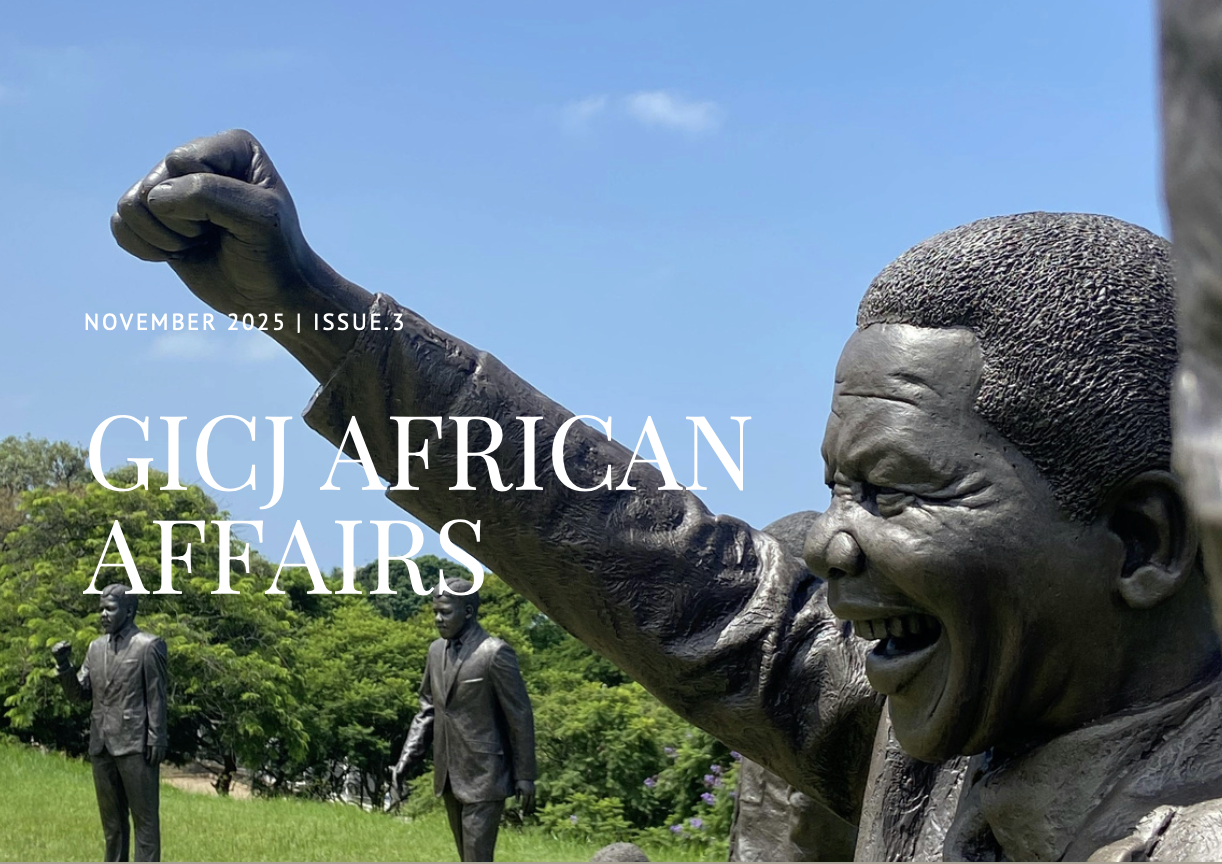
GICJ African Affairs Newsletter, November 2025
Geneva International Centre for Justice presents its third African Affairs Newsletter (Issue 3, November 2025), featuring critical human rights developments across the continent. This edition highlights issues of armed conflict, racial discrimination, women's rights, business accountability, and Africa's engagement during the Human Rights Council's 60th session (HRC60).
The humanitarian catastrophe unfolding in Sudan, which represents one of the most urgent crises, is examined in the newsletter. The ongoing conflict between the Sudanese Armed Forces and Rapid Support Forces has produced devastating consequences, with attacks in El Fasher and North Darfur, collapsing essential services, and triggering mass displacement as of September 2025. Sudan is on the verge of becoming one of the most severe humanitarian crises in recent history, highlighting urgent concerns about civilian protection and the limitations of international humanitarian law in protecting civilian populations during armed conflict.
Equally concerning are the systemic failures in corporate accountability across the continent, particularly regarding child exploitation. The newsletter presents details of acute structural child vulnerability within extractive, agricultural, and manufacturing industries, where multinational enterprises operate largely unchecked. The absence of adequate domestic regulation has created a dangerous vacuum, enabling systemic exploitation of children in sectors that should be subject to rigorous oversight and accountability mechanisms. In The Gambia, the death of a one-month-old infant following female genital mutilation on 11 August 2025 sparked regional outrage and underscored the persistence of harmful traditional practices. Although FGM has been banned since 2015, enforcement remains weak, with only two prosecutions and one conviction in ten years.
Migration remains a pressing regional issue, underscored by the 3 August 2025 boat sinking off Yemen’s coast that killed 68 migrants, mostly Ethiopian nationals. The incident reflects a wider crisis, with 17,580 migrants reported missing across Africa since 2014, raising concerns about the African Union’s limited implementation of its 2006 Migration Policy Framework. In response, AU member states met virtually with the International Committee of the Red Cross on 4 September 2025 to explore stronger safeguards against migrant disappearances, though significant implementation gaps persist. At the global level, Ghana’s President John Dramani Mahama called for the transatlantic slave trade to be formally recognised as the greatest crime against humanity during the UN General Assembly’s 80th session, pushing reparatory justice to the forefront of international debate. This aligns with rising momentum within the UN system, while Kenya’s 2025 Universal Periodic Review further highlighted ongoing concerns over extrajudicial killings, disappearances, and the need for accountability and reform. Broader discrimination issues were also examined through initiatives such as the #CorrectTheMap campaign and discussions at the UN Permanent Forum on People of African Descent, where experts warned of racial bias embedded in artificial intelligence technologies.
During the Human Rights Council’s 60th session, interactive dialogues assessed urgent human rights situations across Africa, including atrocities by armed groups in the Democratic Republic of Congo and allegations of external involvement. The Council reviewed ongoing violations in the Central African Republic, Libya’s stalled transitional justice and shrinking civic space, and Burundi’s highly contested human rights landscape marked by persistent impunity since the 2015 crisis. An enhanced interactive dialogue on 1 October 2025 emphasised how the enduring legacies of slavery, the transatlantic slave trade, and colonisation continue to shape systemic inequalities at economic, institutional, cultural, and symbolic levels. These discussions collectively underscore the need for strengthened international cooperation, accountability, and rights-based approaches across the continent.
The Africa group of Geneva International Centre for Justice is a coalition dedicated to advocating for human rights, justice, and peace across the African continent and for the people of African descent. Through research, advocacy and engagement with the United Nations Mechanisms, the African Group works to amplify African voices in global discussions on peace, security, and development through collaborative work from our volunteers across different African countries in collaboration with our members from the office in Geneva. The team actively engages in addressing ongoing issues of racism, racial discrimination, and slavery with a strong focus on supporting the full and effective implementation of the Durban Declaration and Program of Action. Through the teams’ rigorous efforts, this newsletter aims to provide information on the current and developing human rights issues in the continent with the goal of creating awareness and further shedding light on these issues and to also urge states and civil societies to act on these matters.
Geneva International Centre for Justice (GICJ) calls on the respective governments to take immediate and decisive action addressing these issues and challenges. The responsibility of states to strengthen protection mechanisms, ensure accountability, and uphold international human rights and humanitarian law remains paramount.




